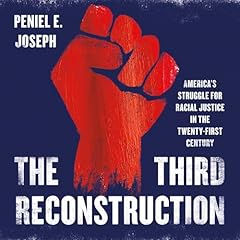
Stokely Carmichael
The Life and Legacy of the Civil Rights Activist Who Led the Black Power Movement
No se pudo agregar al carrito
Add to Cart failed.
Error al Agregar a Lista de Deseos.
Error al eliminar de la lista de deseos.
Error al añadir a tu biblioteca
Error al seguir el podcast
Error al dejar de seguir el podcast
 Exclusivo para miembros Prime: ¿Nuevo en Audible? Obtén 2 audiolibros gratis con tu prueba.
Exclusivo para miembros Prime: ¿Nuevo en Audible? Obtén 2 audiolibros gratis con tu prueba.Compra ahora por $9.76
-
Narrado por:
-
KC Wayman
"Our grandfathers had to run, run, run. My generation's out of breath. We ain't running no more.” (Stokely Carmichael).
In the town of Greenwood, central Mississippi, on the evening of June 16, 1966, one of the most influential speeches in modern American history was delivered on the grounds of Stone Street Negro Elementary School. Earlier in the day, as a body of marchers tried to set up camp on the grounds of the school, they were approached by local officials and law enforcement with instructions to move on. When three men—Robert Smith, Bruce Bains, and Stokely Carmichael—resisted and continued to set up their tents, they were arrested and charged with trespassing. A few hours later, they were released, and the camp remained where it was. Later, Stokely Carmichael delivered an address to a large gathering of marchers and local Black community members, adopting a tone hardly heard in the Civil Rights Movement to date.
"Thank you very much," he began. "It is a privilege and an honor to be in the white intellectual ghetto of the West. We wanted to say that this is a student conference, as it should be, held on a campus and that we’re not ever to be caught up in the intellectual masturbation of the question of Black Power". This was the first open and public use of the term "Black Power".
The setting was a mass march, styled the "March Against Fear", launched a week or so earlier by James Meredith. James Meredith achieved distinction as the first Black student to be admitted to "Ole Miss", the racially segregated University of Mississippi, which prompted another iconic moment in the struggle: The "Ole Miss Riot of 1962". He set off on what was originally intended to be a solitary walk across the Mississippi Delta, from Memphis, Tennessee, to Jackson, Mississippi. He walked with a carved African walking stick in one hand and a Bible in the other. His purpose was to highlight the ongoing regime of segregation and Jim Crow racism in the state of Mississippi in the aftermath of the two key articles of civil rights legislation: the Civil Rights Act of 1964 and the Voting Rights Act of 1965.
Just a month earlier, at 25-years-old, Stokely Carmichael had been elected chairman of the SNCC, one of the most influential, student-based civil rights organizations of the movement, and he very quickly emerged as one of the informal leaders of the march. Numbers swelled as the protest progressed south, and on June 26, during the closing leg, some 15,000 marchers entered the precincts of Jackson, Mississippi, completing the largest civil rights march in the history of the movement to date.
What did the March Against Fear and Stokely Carmichael’s defiant speech of June 1966, achieve? By the time he was elected national chairman of the SNCC, Carmichael had entirely lost hope in the strategy of nonviolent direct action, which was still the dominant protest strategy enshrined in the name of the organization he led. He made it clear upon his assumption of the leadership of the SNCC that Whites, who had always participated in the past, were no longer welcome. The wounding of James Meredith was confirmation to him, as it was to many others, that the long-treasured notion of nonviolence was no longer applicable in the struggle for civil rights in the Deep South of the United States.
In the ensuing years, Carmichael would become one of the most influential and controversial figures in America, founding and leading new organizations while being meticulously shadowed by the country’s national security apparatus, particularly J. Edgar Hoover’s FBI. The attention would ultimately compel him to move to Africa, where he changed his name to Kwame Ture and became one of the world’s most famous Pan-African leaders until his death in Guinea in 1998.
©2022 Charles River Editors (P)2022 Charles River EditorsLos oyentes también disfrutaron:




















Las personas que vieron esto también vieron:

They also, incidentally, gave the wrong date of the Black Power speech. So right from the start it was clear their research was embarrassingly sloppy, calling into question the credibility of the editors. The rest of the book was full of more embarrassingly inept errors.
To compound the issue, the reader of the book mispronounced words like diaspora and apartheid and apparently no editor actually listened to the recording to catch and correct the mistakes.
The overall impression is that Charles River Editors did not take this project seriously. Which leads the reader to wonder if they are to be taken seriously.
Sloppy
Se ha producido un error. Vuelve a intentarlo dentro de unos minutos.


